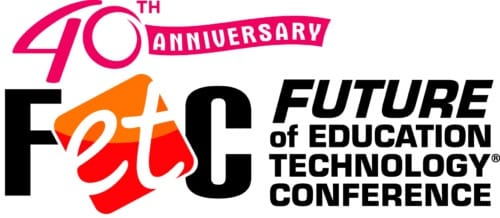A Q&A with FETC presenter Rachelle Dene Poth FETC featured presenter Rachelle Dene Poth is a Spanish and STEAM teacher, an author and frequent blogger on numerous topics relevant to education technology, and someone whose passion for innovative education is infectious. Her ideas are supporting educators’ efforts to bring new technologies and methods to the classroom.
Poth will present an Edchat Interactive webinar, Emerging Tech: Transforming Classrooms with AI, AR and VR, on Tuesday, October 1, at 8 pm ET, in which she’ll introduce some of the key ideas she’ll be presenting at FETC, and provide an early opportunity for educators to engage.
In this brief Q&A, she gave some insights on AI, AR and VR, transformative technologies that are starting to make a major impact in education. Her responses provide some initial background knowledge, which teacher, technology leaders, and administrators can build on by attending the webinar and seeing Poth speak at FETC.
AR and VR are typically grouped together, but there are differences between them. When we discuss AR and VR in classrooms, what are some of the differences educators should know about?
When it comes to augmented and virtual reality, educators just need to understand the basic differences between them and have some tools to get started with them in the classroom. Using any of the tools, we can learn more than we already know by just observing our students and their responses to these different learning experiences. We don’t need a lot of expensive equipment or specific apps or tools―any time we can bring in just a few options for students to try these experiences, we will create more authentic learning for them. Educators should be able to give a few examples, and then ask students to share their own ideas of how these tools could be used in education―and in life, in general.
What are schools learning about using AR/VR tools for a meaningful purpose? Are there things the education community should be learning from other industries that have more experience with this technology?
I think that educators are starting to see the benefits of giving students an opportunity to explore things more closely, especially when it comes to objects and places that were previously inaccessible―whether because of resources or factors like geographical distance or time. We are seeing more in the news about how augmented and virtual reality are being used in different areas of life; in the medical profession, in business, in the military field, as a few examples. We always want to focus on the “why” behind using something like augmented reality, What can you do that’s different than what we always provide for our students? How can we use it to enhance what we are doing in the classroom so that it gives students a closer connection to the content and they attach meaning to it in a way that is personal to them?
I think that we can connect with other industries by looking at how they’ve used AR/VR to benefit employees and what changes it has brought about in how work is done, on how problems are solved, and on how people are trained. Further, it’s a good way to connect students with thinking about career opportunities for the future of work.
For educators and others involved in education leadership, are there some resources you’d recommend for learning more about AI/AR/VR?
I definitely recommend following my blog series on Getting Smart, where I’ve been discussing these topics. Jaime Donally is someone else whose work I’d recommend, including her book, Learning Transported, and her #ARVRinEDU Twitter chat on Wednesday nights from 9 to 9:30 p.m. ET.
I highly recommend the book, Teaching AI: Exploring New Frontiers for Learning, by Michelle Zimmerman, and I am also currently reading a new book, Artificial Intelligence in Education.
Educators can also look into the AI4K12 initiative to learn a lot more, and I would also recommend that people interested in these topics check out Julie Daniel Davis and her podcast, Voice in Education.
Register here for the Edchat Interactive webinar, Emerging Tech: Transforming Classrooms with AI, AR and VR
About
 Rachelle Dene Poth is a Spanish and STEAM: What’s nExT in Emerging Technology Teacher at Riverview Junior-Senior High School in Oakmont, PA. She is an attorney and earned a Juris Doctor Degree from Duquesne University School of Law and a Master’s Degree in Instructional Technology. She is a Consultant and the founder of THRIVEinEDU, LLC.
Rachelle Dene Poth is a Spanish and STEAM: What’s nExT in Emerging Technology Teacher at Riverview Junior-Senior High School in Oakmont, PA. She is an attorney and earned a Juris Doctor Degree from Duquesne University School of Law and a Master’s Degree in Instructional Technology. She is a Consultant and the founder of THRIVEinEDU, LLC.
She serves as President of the ISTE Teacher Education Network and Communications Chair for the ISTE Mobile Learning Network, and has received the Making IT Happen Award from ISTE and the Presidential Gold Award for volunteer service to education.
Poth was selected as the 2017 Outstanding Teacher of the Year by PAECT (the Pennsylvania Association for Educational Communications in Technology, the PA affiliate of ISTE) and by the NSBA as one of the “20 to watch” educators.She is the author of In Other Words: Quotes That Push Our Thinking, Unconventional, and The Future Is Now: Looking Back to Move Ahead. She also blogs for Getting Smart and DefinedSTEM.
Follow Rachelle Dene Poth on Twitter
The 40th anniversary Future of Education Technology Conference (FETC) will take place January 14-17, 2020 in Miami, Fla. Registration is now open at https://www.fetc.org/register
Further Reading
- edCircuit – How an Educator Leverages Diverse Experiences to Motivate Learners
- Getting Smart – Artificial Intelligence: Preparing Students for the Future with AI
- SoundCloud – Julie Daniel Davis Voice in Education

